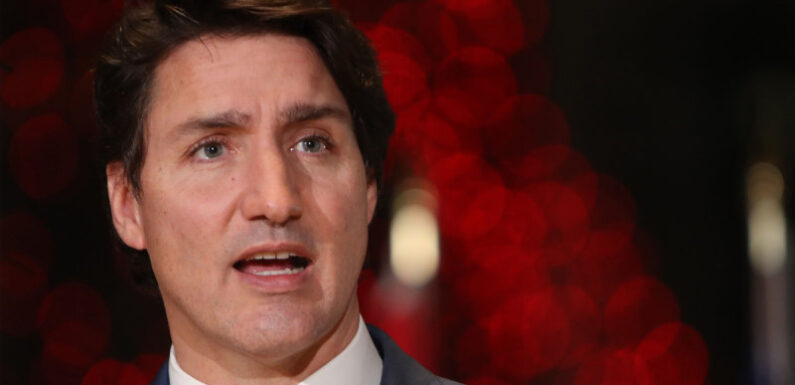
Save articles for later
Add articles to your saved list and come back to them any time.
Washington: Canada has enlisted Australia’s help to create a registry of foreign agents as the Trudeau government attempts to thwart China and other countries from meddling in the nation’s affairs.
Almost five years after Australia set up its Foreign Influence Transparency Scheme – designed to provide the public with details about the nature and extent of foreign influence on government and politics – the Albanese government is now advising Canada as it moves to set up its own.
Canadian Prime Minister Justin Trudeau has faced criticism following a series of reports based on leaked intelligence.Credit: Bloomberg
The reform comes after Prime Minister Justin Trudeau faced a backlash earlier this year over revelations that Chinese diplomats and proxies in Canada allegedly tried to sway the past two federal elections in favour of the Liberal Party, which Trudeau leads.
The efforts are not believed to have altered the outcomes of either election, which took place in 2019 and 2021, but have placed the government under pressure to launch a national inquiry into the allegations and further strained already simmering diplomatic tensions between the two countries.
Those tensions spilled over in May with tit-for-tat expulsions of a Chinese diplomat in Toronto and a Canadian diplomat in Shanghai.
Federal Attorney-General Mark Dreyfus – who visited Toronto last month as part of the Australian-Canadian Economic Leaders Forum – did not wish to comment on Canada’s political situation, but said: “Officials from my department have been talking with officials of the Canadian government about the foreign influence transparency scheme.”
“The interests that Canada has shown our laws is because they don’t have laws of the same kind,” he said. “We’re very happy to assist.”
Australia’s Foreign Influence Transparency Scheme was announced by the former Turnbull government and implemented in December 2018, requiring individuals and corporations to list themselves if they carry out registrable activities in Australia, such as “lobbying, communications or disbursement activities on behalf of a foreign principal for the purpose of influencing a particular political or governmental process, and where no exemption applies”. Failure to register or update your information could result in fines or jail terms of six months to five years.
Parliament passed the scheme after revelations that then Labor senator Sam Dastyari had contradicted ALP policy on the South China Sea while seeking to secure donations from Chinese billionaire Huang Xiangmo.
The registry now features groups and individuals ranging from former Liberal minister Christopher Pyne (whose lobby group has a contract with the United Arab Emirates Embassy) and former prime minister Tony Abbott (who is an unpaid adviser to the UK Board of Trade), to Griffith University (which was awarded grants by Japan’s Ministry of Foreign Affairs).
Former Labor senator Sam Dastyari. Credit: Ben Rushton
But the system – which is “country agnostic” – has not been without its problems. Experts warn the current laws are ill-defined and could result in influence attempts by countries such as China going unchecked.
In February, for example, former prime minister Malcolm Turnbull told a parliamentary committee that a “key purpose” of the register was to disclose the links the Chinese Communist Party’s United Front Work Department had formed in Australia.
“The most active state and political party seeking to influence public affairs in Australia is that of China and the Communist Party of China. We know that, but they don’t seem to appear on the register, and a lot of other countries do,” he said at the time.
Amid intelligence leaks of foreign interference in Canada, the nation’s Public Safety Minister Marco Mendicino announced in March that he would begin consultations on implementing a registry.
The United States has had a similar registry since 1938, known as the Foreign Agency Registration Act. It was recently used to shut down an illegal overseas police station, located in New York, which was operated by the Ministry of Public Security of the People’s Republic of China.
More recently, President Joe Biden’s son Hunter has come under scrutiny over allegations that he may have breached the act as part of his business dealings with Chinese firms.
Trudeau, meanwhile, came under fire following a series of reports based on leaked intelligence to the local Globe and Mail newspaper and Global News. Among them were claims that China provided secret funding through its Toronto consulate to 11 candidates running in the 2019 election, that Chinese diplomats and proxies made undeclared cash donations to political campaigns, and that a conservative MP was targeted by Beijing after he sponsored a motion accusing China of human rights abuses.
China, however, has denied the allegations, while Trudeau initially said the claims were widely exaggerated.
However, in March, he appointed former governor general David Johnston, a family friend, to look into the matter. But in another blow for Trudeau last month, Johnson ended up resigning amid mounting pressure from opposition political parties protesting his appointment.
He subsequently delivered a final report to the Privy Council Office, however, it will not be released to the public.
Get a note directly from our foreign correspondents on what’s making headlines around the world. Sign up for the weekly What in the World newsletter here.
Most Viewed in World
From our partners
Source: Read Full Article

